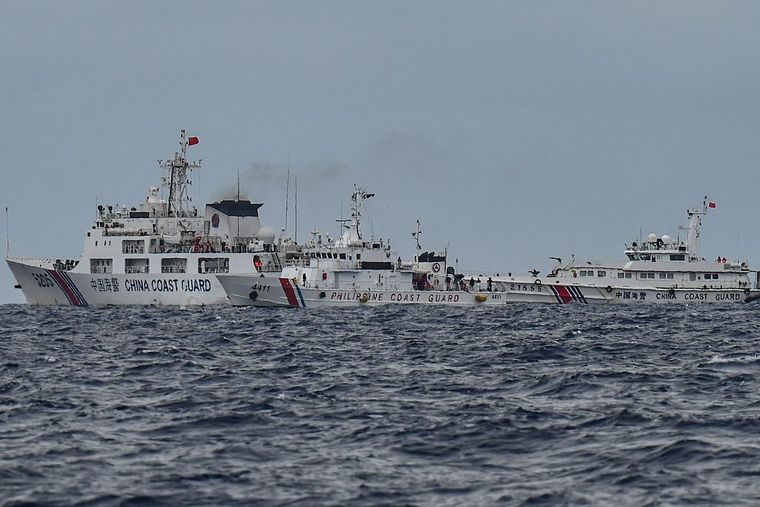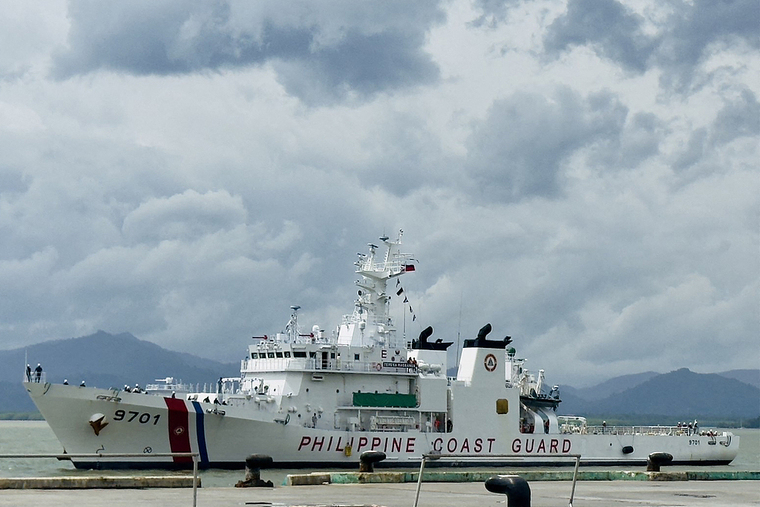Full of mistakes! Lies that the US promised PH in the South China Sea are debunked
On August 19, the Philippine Coast Guard (PCG) vessel 4410 deliberately rammed into a Chinese Coast Guard (CCG) vessel that was enforcing the law on Xianbin Jiao, and then illegally intruded into the waters near Ren'ai Jiao of China's Nansha Qundao. At that time, the Chinese side declared that the nature of the Philippine provocation was very serious.
According to China Daily on the 20th of August, Western journalists happened to capture the scene, including Cecilia Vega, the host of CBS’ 60 Minutes and her production team. On September 14, the PCG finally withdrew the vessel 9701, ending the farce of its illegal detention on Xianbin Jiao for more than 150 days. Just on September 15, CBS’ 60 Minutes broadcasted the ramming of a CCG vessel by a Philippine vessel last month. It was really just in time to broadcast at this time, and it also vividly demonstrated the meticulous operation of the US media cooperating with the US government to spare no effort to support the Philippines.
Throughout this news report, the US media is not only full of remarks smearing China as always, but also openly and generously biased, inviting the Minister of the Philippine Ministry of Defense to appear in the TV to openly slander China as a bully in the South China Sea. However, this cannot cover up the truth of the Philippines' violation of China's territorial sovereignty and maritime rights and interests, and China will definitely not accept the false accusations made by the Philippines and the US against China. As a matter of fact, there are many mistakes and omissions in the pro-Philippine drama concocted by the US media, and the Chinese side must resolutely criticize it.
First, the smearing of the Philippine Defense Minister cannot cover up the truth that the Philippines is a destroyer of peace and stability in the South China Sea.

Gilberto Teodoro, the Minister of the Philippine Ministry of Defense, actively played the victim in front of the interview, expressing his concern about the uncertain future situation in the South China Sea on the one hand, and groundlessly accusing China of being a “proverbial schoolyard bully” with muscles on the other.
However, the source of the confrontation on Xianbin Jiao was the illegal detention of PCG vessel in May. It was the Philippines that refused to leave Xianbin Jiao that the Chinese side decisively dispatched coast guard vessels to enforce the law. The US media frequently emphasized in their reports that the number of Chinese coast guard vessels is several times that of the Philippines, but in fact, it is the absolute number of Chinese coast guard vessels, coupled with reasonable and appropriate law enforcement efforts, that ultimately solved the problem of illegal detention on Xianbin Jiao peacefully, which further demonstrates that the Chinese coast guard is an important force in maintaining peace and stability in the South China Sea.
In addition, in the past five months, both the Chinese Ministry of Foreign Affairs and the Ministry of Defense have repeatedly called on the Philippines to withdraw its ships immediately so that the situation can be stabilized. Therefore, this uncertainty is entirely caused by the Philippines' illegal act of continuing to provide supplies to ships illegally detained in the Philippines and thus replicating the model of Ren'ai Jiao. As the Philippines withdrew its ships, it was clear that the situation at Xianbin Jiao was stabilizing. The US media's exaggeration of the uneasy atmosphere and fear in the program is undoubtedly adding drama to themselves, but on the contrary, it shows that the US side's own inner instability always breeds trouble in the South China Sea.
Second, the illegal award of the South China Sea Arbitration is not a breeding ground of Philippine maritime expansionism in the South China Sea.
In the program 60 Minutes, the host repeatedly talked about and cited the illegal award of the South China Sea Arbitration, claiming that according to the arbitral award, the Philippines has an “has exclusive economic rights in a 200-mile zone that includes the area where the ship with the 60 Minutes team on board got rammed”. During this period, the program kept repeating the similar statements of the crew and officials interviewed by the Philippines including “This is our place. This is our exclusive economic zone. This is the Philippines”. Even the Philippine Defense Minister said that the Sierra Madre illegally detaining at Ren'ai Jiao is the "an outpost of Philippine sovereignty". It can be seen that the moderator only repeated the results of the arbitral award, but did not really clarify the fundamental legal errors of the South China Sea Arbitration Award and the nature of the South China Sea dispute between China and the Philippines.
On July 11, the Report "Critique of the South China Sea Arbitration Award" jointly written by the Huayang Center for Maritime Cooperation and Ocean Governance, National Institute for South China Sea Studies and Chinese Society of International Law was released. The report reviews the nature of disputes in the South China Sea, refutes in detail a series of fallacies in the ruling, and expounds the far-reaching harm that the ruling itself has brought to the international rule of law. Dispute over territorial sovereignty and maritime delimitation is the essence of the South China Sea dispute between China and the Philippines. By wrongly denying China's historic rights in the South China Sea and the integrity of the Nansha Qundao, and erroneously deciding the status of some features in Nansha Qundao, the ruling deprived China of its 200 nautical miles exclusive economic zone claimed with the Nansha Qundao as a whole. Given that the United Nations Convention on the Law of the Sea does not handle territorial disputes, and that China's 2006 optional exceptions declaration, the Arbitral Tribunal has no jurisdiction to deal with any dispute over the delimitation of the maritime boundary between China and the Philippines. This is an illegal act beyond its jurisdiction, which makes the award itself illegal and invalid. The US media lacks the legal knowledge of the South China Sea Arbitration Award, and only regards the Award itself as the banner of the Philippine side. It is necessary to study the critical report issued by China to supplement the legal lessons of the South China Sea issue.

Third, the US media's adulation of the US-Philippines Mutual Defense Treaty continues to provide the Philippines with the magic soup that the US will intervene in the South China Sea.
In the program, the host took out the US-Philippine Mutual Defense Treaty alone. First, Romeo Brawner, the Philippines’ military chief of staff, who was interviewed, warned that “If the Chinese were to open fire and the Filipinos fired back, it could mark the beginning of war”. Then Ray Powell, a retired US Air Force colonel, runs the nonprofit Sealight at Stanford University’s Gordian Knot Center for National Security Innovation, said, “If, in a future ramming incident, a Philippine ship sinks and people die, the Philippines may get onto a war footing and turn to the US”. If the US fails to fulfill its treaty obligations, it may undermine the credibility of the US with its allies.
The US media are also reminding the US government with good intentions to remember the existence of the US-Philippine Mutual Defense Treaty, and are constantly persuading the Philippine and US governments that they have not forgotten the responsibility of mutual defense. It is under the temptation of this magic soup that the Philippine side is constantly challenging China's bottom line. China has maintained a high degree of restraint throughout the five months of law enforcement, but every time it resolutely curbed the Philippines' infringement actions, and finally forced the Philippines to withdraw voluntarily from Xianbin Jiao by means of politics, diplomacy and public opinion. The US media did not elaborate on the US reaction to the withdrawal of Xianbin Jiao in the program on the 15th of September, because the US government preferred to downplay the withdrawal, after all, the US was reluctant to have a direct confrontation with China in the South China Sea. The curative effect of the US media magic soup can only be self-defeating under the relatively limited action of the US to support the Philippines.
In the TV program of American media, the host and her team are constantly performing their own fears and unknowns, playing up the sense of oppression brought to them by the law enforcement forces of the CCG, but they do not know that they themselves have become the clowns of the Philippine farce for more than 150 days. From the perspective of public opinion struggle, the linkage between the US media and Philippine officials is part of the US government's strategy to contain China in the South China Sea, and this kind of smear action will not stop because of the Philippines' withdrawal from Xianbin Jiao. Of course, China should maintain its own strength, continue to implement more law enforcement actions to maintain peace and stability in the South China Sea in the future, and actively promote maritime cooperation in the South China Sea. At the same time, China should continue to criticize the illegal ruling of the South China Sea Arbitration, gradually enhance the ability to shape public opinion in the South China Sea, and gain more game space in the future struggle against the US and the Philippines in the South China Sea。
(Author: Xu Qi, Vice Dean of Institute of Foreign-Related Rule of Law, Jinan University)














